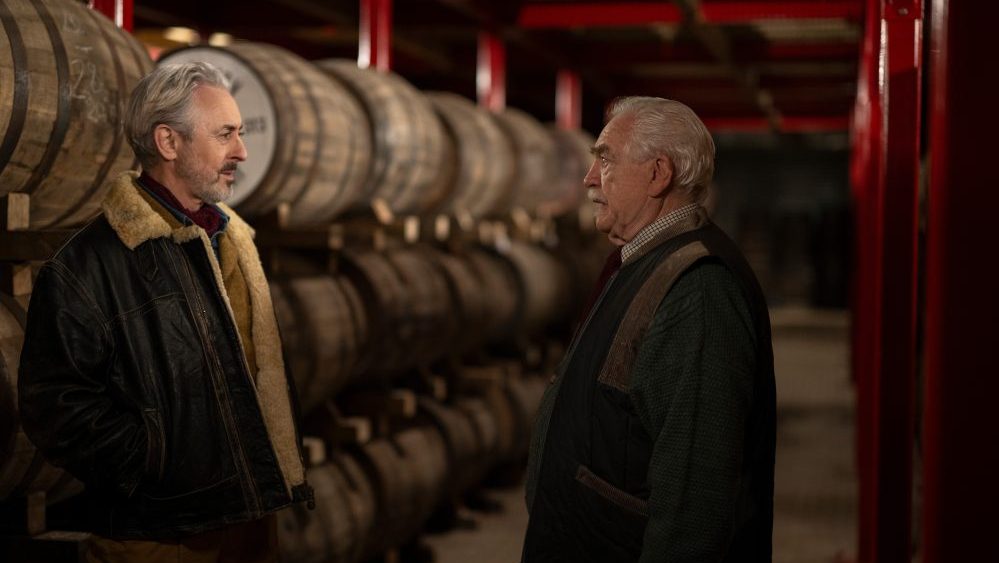Complexity is key to the flavor profile of a good single-malt whisky. Top notes, middle notes and low notes, and different combinations of minerals, spices, smoke and salt make each sip trigger new associations before you even reach the peaty finish. “Glenrothan,” the directorial debut of Scottish actor Brian Cox, is set around a distillery nestled in the Highlands that has long produced a much-admired single-malt dram to an original recipe. So it’s unfortunate that the film itself is more like a bottom-shelf blend: easily drinkable, highly forgettable, bland. Worse still, it won’t get you even mildly buzzed.
It is very quickly established, through shots of the pretty white distillery buildings and the wooded green hills made velvety by the soft Scottish sunshine, that we’re in a storyland, tourist-board version of the country, and that’s fine. Not everything has to be “Trainspotting.” But Scotland is a place of such gorgeous, eccentric mythology and customs, of Celtic gods and caber-tossing, standing stones and selkies, that it’s at best a missed opportunity that one of her favorite sons should choose a narrative that instead embraces only the most familiar and exhausted of kitschy Hollywood formulas. Age down the protagonists, maybe insert Lindsay Lohan wearing tartan as a visiting heiress, and dust it all lightly with snow, and you’d have all the ingredients for an exasperatingly mid Netflix Christmas movie.
The central conflict, such as it ever existed, is already petering out before the story begins. The film opens with Cox’s pleasantly burred vowels in voiceover, as his character, Sandy Nairn, proprietor of Glen Nairn Whisky, reads aloud a letter he is sending to his estranged brother Donal (Alan Cumming). Donal and Sandy haven’t seen each other in almost 40 years, since Donal left for America for reasons that are clear from even the earliest of the many twee flashbacks, but that are still played as though they’re a big revelation late on.
In the interim, Donal has had a daughter, Amy (Alexandra Shipp), who works with him at the Chicago blues bar he owns (the several musical interludes are nice enough; it’s always a pleasure to hear Cumming sing) and who has a daughter of her own, Sasha (Alexandra Wilkie). But when the bar burns down, Donal is finally moved to accept his brother’s invitation and to return with his daughter and granddaughter to Glenrothan (they have been visiting without him all these years and have a good relationship with uncle Sandy). Could Donal have some ulterior, possibly financial, motive for wanting to check out the family business again? But might his overdue homecoming, the rekindling of old flames and a couple of walks in the pretty woods awaken him to the error of his ways?
The old flame in question is sparky indeed. As played by the always terrific Shirley Henderson, Jess, the girl Donal left behind who has gone on to become Glen Nairn’s master distiller, is by far the most interesting character here, and Henderson invests her with such angular, spitfire energy that the film comes briefly to life whenever she’s onscreen. Otherwise, however, the thin characterizations hobble a solid cast, which is especially grievous when the aesthetic, too, is so uninspired. As a director, Cox certainly doesn’t have any notions about himself as a visual stylist, and just lets DP Jaime Ackroyd’s anonymous photography run on glossy, unremarkable autopilot. And perhaps it is modesty that makes Cox background his own role in order to let Cummings’ Donal take center stage, but getting out of the way and letting your actors act only really works when you have a stronger script than David Ashton’s, which clunks and chugs along from cliché to cliché.
It’s hardly fair to conflate an actor with a role, but in Cox’s case it’s pretty unavoidable, given the seismic cultural impact of his indelible portrayal of bellicose patriarch Logan Roy on TV’s “Succession.” Logan, too, was born in Scotland. He too had a hard childhood. He too became estranged from his only brother. But viewers expecting any of Logan Roy’s ferocity or indeed any of the steeliness of Cox’s Hannibal Lecktor or the gravitas of his Shakespearean theater roles will be disappointed by his recessive, only mildly irascible turn as Sandy. And more importantly, they’ll be nonplussed overall by the insipid, low-stakes “Glenrothan,” which could have done with a good slug of Scotch itself, to put a little fire in its belly.
